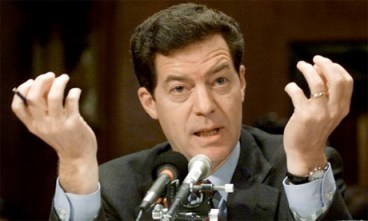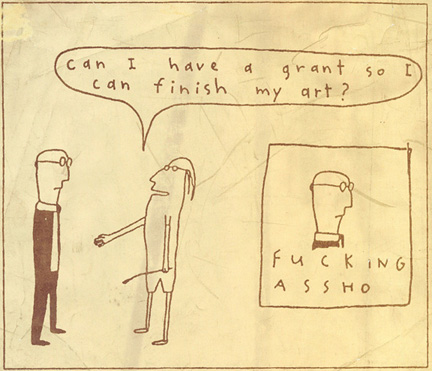The Kansas Arts Commission closed this week after Governor Sam Brownback slashed funding for the arts. Though artists, parks, schools, and libraries have benefitted from the Commission through grants, the governor used a line item veto to defund the organization. Gov. Brownback says he hopes to see private donations work to fill the gap left in funding.

As expected, this has left everyone in a quandary over whether or not the arts should be publicly funded. Shannon Reilly, the artistic director at the Topeka Civic Theatre and Academy, said her organization has avoided public grants in the past and has appreciated the freedom it’s given them.
Her views are echoed by Lawrence Reed, an economist from the Foundation for Economic Education, who believes that “The arts are simply too important to be dependent on the government. When you are dependent even partially on government funding, you always run the risk of being buffeted by changing political winds.” Like it or not, he’s not wrong about politics swaying support for different projects. Remember when John Boehner and Eric Cantor got the Smithsonian to remove certain pieces from an exhibition because they were deemed offensive? Or the giant political debacle resulting from Mayor Gulliani and the House of Representatives not approving of The Brooklyn Museum of Art’s Sensation exhibit? (Fun fact: L Word Season One’s art museum-protest storyline was inspired by the Brooklyn Museum’s situation)

Others who support the governor’s move believe that subsidized art is by definition not widely popular. If a project appeals to a large group of people, they argue, their economic power will keep it running. If you’re looking for an economic counter-argument, the Baumol effect shows how despite being paid more, workers in the arts have have not made innovations in labor productivity. While a factory worker can produce lampshades faster today than in 1950, it still takes the same number of musicians the same amount of time to play a symphony. A symphony costs a serious amount of money to produce and ticket sales can’t make up the difference.
If you’re just concerned about this whole line of thinking that says that the market should dictate every aspect of life, you’re not alone. We know we’re not the only ones struggling to find a sustainable business model. Ruby Lerner is the executive director of Creative Capital, a private arts funding organization, but even she worries that projects that aren’t “flashy” enough will suffer without public funding.
Art speaks to commonalities as well as differences in the American experience. Offering public funding for art affirms its value in our society. Left up to a public vote by dollars, expression suffers from the tyranny of the majority. There’s no denying that the economy is suffering and that budgets need revamping, but is this the route to take? If art and progress have historically gone hand and hand, maybe art is too important not to be publicly funded.









Comments
I got SOOOO excited to see Kansas on AS..and then I had to cry a little.I’m pretty sure that Gov. Dumbback kills kittens at Cedar Crest in his spare time, because he’s on a crusade against hope and love…my poor state may not survive.
Are you from Kansas? Because, technically, I am, and I also got excited to see Kansas on here. Like maybe Kansas did something right for once. And then I saw “Brownback” in the first sentence and knew it wasn’t good. Maybe someday. *sigh*
I am from Kansas..I still live here, too! I contemplate moving every day when I read the paper, though…Brownback is pretty much the worst person ever. I miss Kathleen Sebelius.
Srsly. Me. Too. I’m in Iowa right now, but I keep up to date on KS shit, and god, that state needs a little more Sebelius and a little less douchecanoe
I miss Sebelius SO MUCH.
i got really trashed at a state dem function once and whispered in her ear that i thought she was the hottest governor ever..greatest night of my life.
That is hands down one of the coolest things I have ever heard of.
That. is. amazing.
I miss Sebelius too. Brownback is a monster.
I’m about to get my BFA in Illustration and I’m just like thanks Brownback for showing us your contempt for a whole portion of society. Cool.
I’m from Kansas, too. I have nothing to add, I just wanted to share in your disappointment.
Im from Kansas also, and i too got crushed to see Kansas in such a bad light because of one dumbasses view. There is so much good and unity that happens in the area such as way over 5,000 volunteers to the joplin area in three weeks and this is what we get…..it makes me real angry!!!
I currently work for an organization that is funded by the KAC.
was.
Fuck.
“Others who support the governor’s move believe that subsidized art is by definition not widely popular.”
Yeah, because being widely popular is the standard by which we should be judging art…
What idiots.
THIS.
Van Gogh only sold one painting in his life, Mozart and Bach both died as paupers…the list goes on and on. As well as the forgotten ones who got rich off of appealing to the lowest common denominator.
BRUCE WILLIS IS A GREAT ARTIST
As a composer and musician, I just wanted to thank Autostraddle for covering this. I remember being really irritated that when the budget negotiations were coming up, so little attention was given to the proposed NEA cuts compared to those for Planned Parenthood or NPR (not that those weren’t bad, too). I’m in contemporary classical music, which gets very little private funding compared to other types of classical music – as so many of the big classical music donors are older, wealthy adults who often have little interest in anything beyond the 18th-19th century canon. The reason we continue to have fresh, current voices in classical music is largely due to government funding at the federal AND state and local levels, such as NEA grants for composers and contemporary music ensembles.
If we can spend over half our federal taxes on unnecessary wars, we can sacrifice a few pennies per taxpayer at every level to be able to keep the artists we most need – those who challenge the status quo and speak unnecessary truths. The artists who will be part of the canon tomorrow when the public catches up, but are too weird for today. We can’t have that if we expect all art to be commerically viable. In any case, having museums, concert halls, opera and theater companies and orchestras are good even for those who don’t go to those places – because they attract tourists as well as residents. A big part of why I chose the university I’m at right now is because it was in a big city where I knew I’d be part of a larger arts scene beyond just the one at my school. There are great music schools in the middle of nowhere, but it’s just not the same as being right where all the cutting-edge stuff is happening.
Btw, my comment about classical music donors is not a slam on old people – there are a lot of totally awesome ones who support contemporary classical music. But in general, the audience skews younger. I worked at a program my school sponsors for retired adults who want to take classes there in music, and many of them just assume that anything composed after World War II is going to be ear-splitting and crazy.
While I can understand the distrust toward government funding, especially after the Smithsonian mess, I think it’s a terrible, terrible thing to completely get rid of funding for the arts. Schools need that money, libraries need that money, and art isn’t exactly something you can apply a capitalist model to. This makes me really sad.
Yes! I’m employed by a youth outreach/arts employment program in kansas. They provide jobs for “at-risk” [terrible phrase] 14-21 year olds. Specifically people in foster care, with disabilities, or those with low-income. They rely on KAC for much of their funding and supplement the rest by selling the art. This organization has had a profound, positive impact on so many lives including mine.
We need to be funding more programs like this.
Brownback is just pushing his pointless agenda. There was no reason to cut the .005% [literally] of the state budget that went to art. This makes us the only state in the union without a state funded arts program.
He who pays, controls.
No thanks.
Whoever funds is going to insert some kind of opinion into what kinds of things get funding…whether I want that to be determined by the public or the government I don’t know. But I think the point that innovation is often not widely accepted when it first occurs is valuable, especially when it comes to art.
This thread just became the Kansas lesbian introduction thread (hey guys!).
Kansas was at one point in time a fairly progressive state . Wichita used to be one of the centers of the beat generation writers. Sadly this is not the case anymore. I think for the most part the state is bleeding jobs and people as people move out of small towns for big cities (that aren’t in Kansas) and anything that doesn’t generate immediate profit is suspect. If only they understood that arts education helps keep people here…
Alas.
last weekend at Symphony in the Flint Hills gov. brownbutt said in his speech “we sure do love our flint hills!”..a heckler in the crowd yelled “we love our arts!”
such a hypocrite.